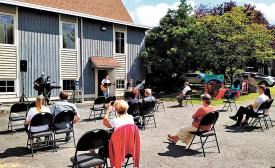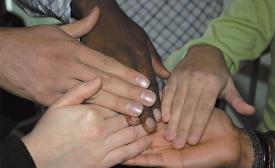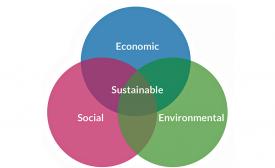Called to deep hope
Mary Magdalene couldn’t have known the end of the story—how things would turn out. How could she?
Mary Magdalene couldn’t have known the end of the story—how things would turn out. How could she?

In a piece titled “Migrant Journey,” artist Rafael Barahona explores a universal story that includes many perils but also a sense of hope. The art was inspired by Jeremiah 29:11 and Hebrews 11:1 and appears in the hymnal collection Voices Together, published by MennoMedia. (Artwork used with permission of Rafael Barahona)

For the digitally created image titled “Communion,” Canadian artist Dona Park depicted soup and rice, expanding the idea of communion beyond bread and wine to show it as an international feast. (Artwork used with permission of the artist)
One of the striking things about Voices Together, the new Mennonite song collection, is that it includes 12 pieces of visual art.

Following provincial protocols for meetings during the pandemic, members of Sherbrooke Mennonite Church in Vancouver gather for an outdoor service, in the summer of 2020. (Photo by Garry Janzen)
Justin Sun has never known pastoring other than during a pandemic. A year-and-a-half into his first pastorate, he says, “It’s been rough. How do I even do this job? I didn’t even attend a real in-person service until June.” That was nine months after he started in is job as a youth pastor in Richmond, B.C.
Although some Mennonite churches in Canada have wrestled with whether to accept LGBTQ+ people in their congregations, the conversation around queer issues is rapidly expanding in the public sphere.
My family does cancer in a big way. In my immediate family of five members, there have been 10 occasions when a doctor told one of us that we have cancer, or that, despite the treatments, the cancer has returned. My wife Esther has had two rounds of breast cancer. Our son Tim, who was born with significant physical and mental disabilities, was diagnosed with a brain tumour when he was three.
Annie Janzen earned no degrees and was never elected chair of a church council. She did not start a church, write a best-seller or perform for large audiences.
She did cook at Canadian Mennonite Bible College in Winnipeg for 27 years, travel the globe and make an unlikely diversity of friends. She lived a good, simple life. It was also a decidedly unconventional life.
Did you know, there are over 650 occurrences of the word “power” in the Bible? Dunamis, a Greek word for power, occurs 120 times in the New Testament and means “strength” or “ability.” It is used to describe, for example, the power of God (Matthew 22:29), the power of Elijah (Luke 1:17), and the power of evil spirits (I Corinthians 15:24).

A sketch of the meetinghouse used by the Moyer Mennonite congregation, in Vineland, Ont., before 1897. The church was later renamed The First Mennonite Church. (Photo: L.J.Burkholder collection, Mennonite Archives of Ontario)
What do we do when we disagree with people in our church? There are lots of reasons to disagree. We can disagree about how we talk about salvation, about who we should include or not include, about political views, or even about vaccination. Across North America, we see issues dividing congregations and conferences.
The first Sunday of Advent marks the beginning of the Christian year, so it would be appropriate to greet each other with the recognition that a new year has begun.
A public apology is one of many ways that a church may address past wrongs and those persons who have been harmed. Right now, for example, even following the apology by the Canadian Catholic bishops, there remains a strong call for an apology by Pope Francis for residential schools in Canada and abuses that happened there.

After entering the Men Can Cook competition, Jawanda Clemence discovered a love of cooking. Now he helps train new competitors and has developed a number of his own recipes. Here he’s teaching a recipe for mashed lablab to a group of women. At the time this photo was taken, COVID-19 measures in Zimbabwe only included a recommendation for mask use. (Score Against Poverty photo/Obert Payenda)
All of Joseph Gudo’s hard work was summed up in one small plate of food. He’d laboured for months in the field and uncountable hours in the kitchen all in service to this dish—a neat pile of mashed cowpeas (black-eyed peas), buoyed by a bold pinch of cayenne pepper and dressed up with pops of colourful diced tomatoes and green peppers.
On March 11, 2020, the day before Manitoba reported its first infection of the coronavirus, Bronwyn Dobchuk-Land stood up in a multipurpose room at First Mennonite Church in Winnipeg to give a lecture exploring the question: How is it that Winnipeg has so many police, and so little justice and peace?
Do Mennonites believe there is something intrinsically, inherently important about our denominational institutions? If you think not, then you can skip this article and pick up another article instead.

One of the three chairs represents the directee, or client, who is seeking support on their spiritual journey. The second chair represents the spiritual director—the one who is listening in three directions: Out, to their client; up to God; in, to notice their own responses. The third chair is a reminder that the real spiritual director is the Holy Spirit. (Photo by Ralph Brubacher)
When I was taking part in the Ontario Jubilee program in soul care and spiritual direction, one of the principles that guided our time together was that everything we did as a whole group happened in a circle.
Recovering a lost language or learning to speak a language doesn’t happen overnight. But a desire to learn will unbolt the door—swinging it wide open—and fill our lungs with sparkling morning air.

“How we talk to and treat each other matters and communicates the love of God. Sometimes in church we have to be willing to have hard conversations—to talk about what healthy relationships look like—not just about how we sexually relate, but how we speak to each other, and how we treat those on the margins.” (istock.com photo by Steelalevi)
Abuse. It’s one of those topics that can stop a conversation dead in its tracks. Yet those who work in the area of abuse response and prevention say that talking about it—before it happens—is precisely what the church needs to do.

‘St. Paul in prison,’ by Rembrandt, in the Staatsgalerie in Stuttgart, Germany. (Photo © José Luiz Bernardes Ribeiro (cc-by-sa/4.0))

This mural of Julian in Norwich, Norfolk, Great Britain, was painted by Antony Allen in January 2020. Julian is believed to have been the first woman to write a book in English that has survived. It is entitled Revelations of Divine Love and is based on a series of 16 visions she received on May 8, 1373. (Photo © Evelyn Simak (cc-by-sa/2.0))
Last September, at the school where I teach, the director noted the many restraints and restrictions staff and students were experiencing because of the COVID-19 pandemic. It seemed that everywhere we turned, we were told we couldn’t do something. Many excellent teaching practices were out of reach because we needed to maintain social distancing.

The five ‘amigos’—members of the Global Community of Young Anabaptists—joined hands at St. Jacobs (Ont.) Mennonite Church in early 2005. The hands belong to Sarah Thompson (North America), Amandus Reimer (South America), Elina Ciptadi (Asia), Khohlwani Moyo (Africa), and Barbara Kärcher (Europe). (CM file photo by Ross W. Muir)
 By Doug Klassen
By Doug Klassen
Amidst the darkness and uncertainties of the past year, there have been some gifts in this pandemic time. One of these gifts has been increased acknowledgement of the existence of mental-health challenges, and of the reality that, for many, this is a profound struggle.
The Epistle to the Romans has been called the Apostle Paul’s great masterwork, the summing up of all his thought. It is a rich, dense and complex work of theology that has stimulated some of the most powerful reform movements in Christian history. But, once upon a time, almost 2,000 years ago, it was a letter carried by a woman named Phoebe.
“Rainy days,” Calvin and Hobbes cartoonist Bill Watterson once wrote, “should be spent at home with a cup of tea and a good book.”
As part of Canadian Mennonite’s biannual Focus on Books & Resources section, the magazine spoke with 14 people about the novels, poetry collections and non-fiction works that have impacted them.

It’s as if we are on a ship heading straight for the rocks in spite of warning buoys, lighthouses or even the jagged shoreline looming ahead. Individual efforts seem insignificant, a choice between rearranging the deck chairs on the Titanic and trying to turn the ship with our bare hands. (Photo by Wollox / Creative Commons Licence (bit.ly/3rLhdz4))

The shipwreck of the SS American Star on the shore of Fuerte-ventura, one of the Canary Islands. (Photo: By Wollox / Creative Commons Licence (bit.ly/3rLhdz4))

When considering how to act against the damage of climate change, too often the focus has been only on the economic reality (i.e. Can a profit be made?), while ignoring the effects on environmental and social systems. But true sustainability only occurs at the place where all three spheres overlap. (Graphic by Betty Avery)
Every time you walk into the church building, that threadbare carpet stares up at you. Everyone agrees it’s time for a change, but how do you replace a worn-out carpet without destroying the planet?
When you consider Jesus’ three-year ministry, which specific events come to mind? Which of his actions inspire you the most?
When I was in seminary, one assignment was to pick one of the gospels and to identify every encounter Jesus had in that gospel. We were asked: